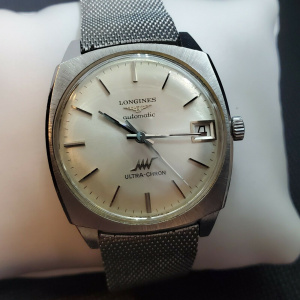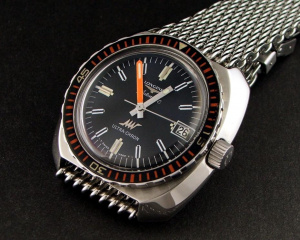Longines Ultra-Chron: Difference between revisions
| (One intermediate revision by the same user not shown) | |||
| Line 9: | Line 9: | ||
==Brief History== | ==Brief History== | ||
Debuting in 1967, the Ultra-Chron was built to celebrate Longines’ centenary. With Girard-Perregaux’s Gyromatic debuting a year before and Seiko’s Lord Marvel around the same time, the Ultra-Chron was one of the earliest watches to operate at 36,000 bph at a time when the standard was just half that. When it debuted, Longines claimed in its advertisements that the Ultra-Chron was “the world’s most accurate watch,” and was guaranteed accurate to within a minute per month (or about two seconds per day). | Debuting in 1967, the Ultra-Chron was built to celebrate Longines’ centenary. With Girard-Perregaux’s Gyromatic debuting a year before and Seiko’s Lord Marvel around the same time, the Ultra-Chron was one of the earliest watches to operate at 36,000 bph at a time when the standard was just half that. When it debuted, Longines claimed in its advertisements that the Ultra-Chron was “the world’s most accurate watch,” and was guaranteed accurate to within a minute per month (or about two seconds per day). | ||
The Cal. 431 movement has a central second hand (the best way to view the high-frequency movement in action as the hand glides around the dial) and a non-quick-set date at 3 o’clock which jumps instantaneously at midnight. It has 25 jewels and is 25.6 x 4.80mm in size (note the Cal. 430 has 17 jewels and is 4.30mm high). The movement is engraved with “adjusted in 4 positions and temperature” as well as with the escapement speed of “36000”. The central automatic bi-directional, bi-metallic winding rotor is mounted on ball bearings and has a heavy tungsten-carbide perimeter. The centre of the rotor is pieced with the flying hourglass symbol of Longines and acts as a shock absorber. The power reserve is 42 hours. The escapement features a screw-less, three-spoke, glucydur balance with a KIF-ultraflex shock absorber, fine regulation by an eccentric screw and a flat Nivarox, non-magnetic, self-compensating hairspring. The movement was made in-house by Longines, but utilized the Clinergic-21 Swiss-anchor escapement, so named because of the 21 teeth of the steel escape wheel. The fourth wheel has 100 teeth and a pinion with 7 leaves. The seconds hand is driven indirectly. The high-beat escapement is dry-lubricated with molybdenum bisulphide. | |||
The high-beat revolution didn’t catch on so much beyond the late ’60s and early ’70s, perhaps due to the growing ubiquity of the quartz watch, but the Ultra-Chron did remain in production well into the 1970s. | The high-beat revolution didn’t catch on so much beyond the late ’60s and early ’70s, perhaps due to the growing ubiquity of the quartz watch, but the Ultra-Chron did remain in production well into the 1970s. | ||
| Line 31: | Line 33: | ||
* Water resistance: Not rated | * Water resistance: Not rated | ||
* Vintage: '60s | * Vintage: '60s | ||
==Links== | ==Links== | ||
* [[Longines]] | * [[Longines]] | ||
Latest revision as of 23:30, 9 June 2020

Longines Ultra-Chron
Released in 1967, one year after the Gyromatic, the Ultra-Chron’s special lubricant—molybdenum bi-sulphide—solved the friction issue that plagued the early hi-beat movements. Advertisements touted the Ultra-Chron’s accuracy to “within a minute a month.”
The Longines UltraChron is a watch that ticks all the boxes of a proper vintage dress piece. Introduced in the late 1960s and produced for only six years, the UltraChron is an early attempt by the brand to mass-produce a mechanical watch that, according to their advertisements, was "the world's most accurate watch... guaranteed accurate to within one minute per month." This was achieved with the hi-beat Caliber 431 movement, which had a beat rate of 36,000 beats per hour.
A number of movements were used in the Ultra-Chron over the nine years of production. These included the Cal. 430 (centre seconds), Cal. 431 (centre seconds with date), Cal. 432 (hours and minutes only), Cal. 433 (date only) and some interesting manual wind movements which featured a hacking second hand which would stop when it reached the 12 mark (the Cal. 6952 with date and Cal. 6972 with day and date). The later Cal. 6651 and Cal 6652 models beat at a slower 28,800vph, but also had “Ultra-Chron” on the dial.
Brief History
Debuting in 1967, the Ultra-Chron was built to celebrate Longines’ centenary. With Girard-Perregaux’s Gyromatic debuting a year before and Seiko’s Lord Marvel around the same time, the Ultra-Chron was one of the earliest watches to operate at 36,000 bph at a time when the standard was just half that. When it debuted, Longines claimed in its advertisements that the Ultra-Chron was “the world’s most accurate watch,” and was guaranteed accurate to within a minute per month (or about two seconds per day).
The Cal. 431 movement has a central second hand (the best way to view the high-frequency movement in action as the hand glides around the dial) and a non-quick-set date at 3 o’clock which jumps instantaneously at midnight. It has 25 jewels and is 25.6 x 4.80mm in size (note the Cal. 430 has 17 jewels and is 4.30mm high). The movement is engraved with “adjusted in 4 positions and temperature” as well as with the escapement speed of “36000”. The central automatic bi-directional, bi-metallic winding rotor is mounted on ball bearings and has a heavy tungsten-carbide perimeter. The centre of the rotor is pieced with the flying hourglass symbol of Longines and acts as a shock absorber. The power reserve is 42 hours. The escapement features a screw-less, three-spoke, glucydur balance with a KIF-ultraflex shock absorber, fine regulation by an eccentric screw and a flat Nivarox, non-magnetic, self-compensating hairspring. The movement was made in-house by Longines, but utilized the Clinergic-21 Swiss-anchor escapement, so named because of the 21 teeth of the steel escape wheel. The fourth wheel has 100 teeth and a pinion with 7 leaves. The seconds hand is driven indirectly. The high-beat escapement is dry-lubricated with molybdenum bisulphide.
The high-beat revolution didn’t catch on so much beyond the late ’60s and early ’70s, perhaps due to the growing ubiquity of the quartz watch, but the Ultra-Chron did remain in production well into the 1970s.
Notable Ultra-Chron Models
The Ultra-Chron also offers buyers a significant amount of variety, too: the movement made its way into a multitude of designs, from dress watches, to field watches to divers. You can even get a square-cased Ultra-Chron.
7950 Ultra-Chron Diver

Reference 7970-5, was released in the late 1960s. The hi-beat Calibre 461 movement is housed in a cushion case surmounted with a Bakelite bezel in vibrant orange and black. Though rare, the Reference 7970-5 is not as rare as the manufacture’s other vintage diver—the SuperCompressor, Reference 7150-1.
- Reference 7970-5
- Case Diameter: 41mm
- Case Height: 12 mm
- Case length: 42 mm
- Lug Width: 22 mm
- Movement: Longines 431 automatic,25j, 36.000 bph, 39 hr power reserve,
- Case material: Stainless steel
- Crown: Non-screw down
- Bezel: Uni-directional indexed w/ 60
- clicks
- Water resistance: Not rated
- Vintage: '60s
